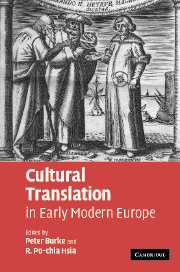Book contents
- Frontmatter
- Contents
- Notes on contributors
- Introduction
- PART I TRANSLATION AND LANGUAGE
- PART II TRANSLATION AND CULTURE
- PART III TRANSLATION AND SCIENCE
- 9 The role of translations in European scientific exchanges in the sixteenth and seventeenth centuries
- 10 Scientific exchanges between Hellenism and Europe: translations into Greek, 1400–1700
- 11 Ottoman encounters with European science: sixteenth- and seventeenth-century translations into Turkish
- 12 Translations of scientific literature in Russia from the fifteenth to the seventeenth century
- Bibliography
- Index
12 - Translations of scientific literature in Russia from the fifteenth to the seventeenth century
Published online by Cambridge University Press: 27 July 2009
- Frontmatter
- Contents
- Notes on contributors
- Introduction
- PART I TRANSLATION AND LANGUAGE
- PART II TRANSLATION AND CULTURE
- PART III TRANSLATION AND SCIENCE
- 9 The role of translations in European scientific exchanges in the sixteenth and seventeenth centuries
- 10 Scientific exchanges between Hellenism and Europe: translations into Greek, 1400–1700
- 11 Ottoman encounters with European science: sixteenth- and seventeenth-century translations into Turkish
- 12 Translations of scientific literature in Russia from the fifteenth to the seventeenth century
- Bibliography
- Index
Summary
At the beginning of the fifteenth century, Russia had no place on the map of Europe. At that period, the most important Russian states were: the Moscow Dukedom (Moskovskoe Knyazhestvo) and the Novgorod Republic (Gospodin Velikii Novgorod). Only in 1380, after the Battle of Kulikovo, did Russian soil begin to be liberated from the Tatar yoke. During the reign of Ivan III (1462–1505), the Russian state was established. The tsar's ambitions were revealed by the adoption of a new state emblem: the two-headed Byzantine eagle. In this way the Grand Duke declared Russia to be the heir to the Byzantine Empire, the centre of the Orthodox world. In the sixteenth century, the monk Filotei developed the theory of Moscow as being the third Rome (‘and a fourth there shall not be’).
From a cultural point of view, Russia in 1400 was an actively developing and very distant province of the Byzantine Empire, whose power was waning at that time. An Orthodox country, Russia was hostile to every idea coming from the West, especially if the idea was connected to Catholicism. This hostility increased after Rome's attempts to extend its influence to the East. It is in this context that we need to examine the problem of translations of Western scientific literature in the fifteenth and sixteenth centuries.
TRANSLATIONS IN RUSSIA IN THE FIFTEENTH AND SIXTEENTH CENTURIES
After the Grand Duke of Kiev St Vladimir (reigned 978–1015) became a Christian, Russia was introduced to the Christian world and drawn into European culture.
- Type
- Chapter
- Information
- Cultural Translation in Early Modern Europe , pp. 212 - 217Publisher: Cambridge University PressPrint publication year: 2007

